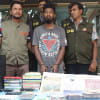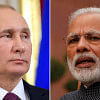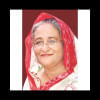The Teacher and the Preacher: Lessons of History
Germany now has the best economy in Europe. It is also one of the leading industrialised nations in the world with a functioning democracy, where more than a million Afghan and Arab refugees have so far poured in, seeking safety from violence in their war-torn countries. But merely three hundred years ago, it was a poor, heavily rural country with few urban centres. All that changed with the Age of Enlightenment, which paved the way for its modernisation and development. One of the greatest philosophers of that age was Christian Wolff. Born to impoverished parents in Breslau, he became a professor of mathematics and natural philosophy at the University of Halle in 1707. He was a prolific thinker who earned a great reputation in the next twenty years. But his ideas drew the ire of the Pietists, Christian fundamentalists, who called him an atheist, a pagan, a Confucian, because Wolff declared, pointing to China, that a great society could be based on rationality. The Pietists influenced the Prussian king, Friedrich Wilhelm I, to banish the philosopher. So Wolff had to leave the Prussian territory within 24 hours under threat of death.
He went to the University in Marburg and gained an even stronger reputation for his ideas. In the meantime, Friedrich Wilhelm I had passed and his son Friedrich Wilhelm II became the king of Prussia. A patron of the arts and the Enlightenment, he invited Christian Wolff to return to Halle, and the philosopher did. His return was considered a cultural victory for Prussia as well as for rationality. This champion of academic freedom was later celebrated as "the teacher of Germany" and ennobled - the only philosopher in history to be honoured like that. All this was possible because of a prudent king - now better known in English as Frederick the Great - who established religious tolerance and freedom of the press, and helped Prussia ascend to a leading European power.
One could say that it was Christian Wolff who paved the way for celebrated German thinkers like Immanuel Kant, Arthur Schopenhauer, Friedrich Nietzsche, Wolfgang von Goethe, and others in Western Europe, ushering in the great social and scientific achievements of the l9th century, propelling Europe to the height of human civilisation because the Europeans sought knowledge "beyond the utmost bound of human thought," in Tennyson's words. Although later, Germans had to suffer in the First World War and the Second World War due to megalomaniac political leaders obsessed with power, the spirit of Enlightenment that was ingrained in German society has helped them to strive with a Faustian urge to lift themselves from the ashes of every catastrophe to the present state.
While Christian Wolff's rational philosophy in the 18th century was leading Germany and the rest of Western Europe from religious fundamentalism to Enlightenment, the puritanical teachings of the preacher Muhammad ibn Abd al-Wahhab was taking hold in Saudi Arabia. Popularly known as Wahhabism, it became the leading form of Sunni Islam in Saudi Arabia under the patronage of the House of Saud. This ideology is behind the Taliban's ascendency to power during the civil war in Afghanistan in the 1990s, where its adherents flocked to by the thousands, to help the mujahideen fight modernisation. It is also known to be the ideology of the Islamic State and those fighting in Syria to remove the Shia president Bashar al-Assad. Reminiscent of the religious wars of Europe before the Enlightenment, these wars are sending millions of Afghan and Arab refugees to seek shelter in Europe, a Europe enlightened by the rationalist ideas of philosophers like Christian Wolff.
Millions of our people also fled to India during the Liberation War in 1971 to seek refuge from the atrocities of the Pakistani dictator General Yahya Khan and his local collaborators, those henchmen who killed their fellow citizens in the name of Islam. But thanks to the bravery of our freedom fighters, we were able to defeat the forces of evil and gain independence. It cost the precious lives of three million of our people. Hence, the father of our nation, Bangabandhu Sheikh Mujibur Rahman, declared on January 10, 1972 at a public rally in New Delhi – during a stop-over while he was on his way home from Pakistani captivity – that we would be a secular nation. We promised then that we would not cause suffering to anyone in the name of religion. We decided that we would be defined by our humanity, not any faith. We said that our first identity would be Bangladeshi, not Muslim or Hindu. However, after the Taliban took power in Afghanistan, the Wahhabi ideology began to spread in the Indian subcontinent. The novelist Taslima Nasreen had to leave our country due to death threats by religious zealots and lost her citizenship. Attempts were made on the life of the late poet Shamsur Rahman and that of the Awami League leader and current Prime Minister Sheikh Hasina. Leading politicians and secular thinkers like Avijit Roy and others were killed. Those who are involved in these jihad-inspired terrorist activities are no different from the Pakistani collaborators during the Liberation War in 1971. They wish to turn us again into a subjugated people who will not be able to think for themselves but do the bidding of others. How will we then survive or develop as an independent nation? Their ideology is an insult to our freedom fighters and to the father of our nation.
We are now at a crossroads in our history. Our future and the future of our descendants will depend on the decision we make today as a society, whether we want a war-ridden underdeveloped society run by despots of one kind or another, or a relatively peaceful and prosperous society with a functioning democracy. Frederick the Great's decision regarding Christian Wolff can serve us well in this respect.
The writer is an English professor and educator at the University of Texas Rio Grande Valley, USA.

 For all latest news, follow The Daily Star's Google News channel.
For all latest news, follow The Daily Star's Google News channel. 








Comments